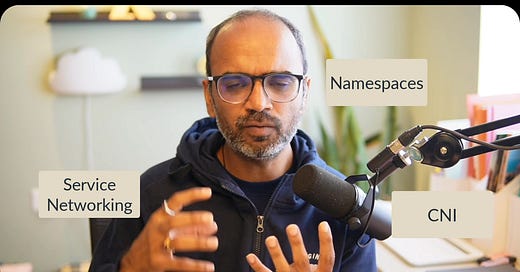This masterclass provides a rigorous and exhaustive analysis of Replica Sets, Namespaces, Service Networking, and the Container Network Interface (CNI)—fundamental elements crucial for designing scalable, resilient, and highly available Kubernetes ecosystems. Mastering these components is essential not only for Kubernetes practitioners but also for candidates preparing for advanced certifications such as CKA, CKAD, and CKS. This course serves as a comprehensive reference for engineers, architects, and researchers looking to deepen their understanding of Kubernetes networking and orchestration.
Conceptual Significance of These Topics
1. Replica Sets: Architecting Availability, Fault Tolerance, and Scalability
The distributed nature of Kubernetes is predicated upon ensuring high availability and horizontal scalability through Replica Sets. A granular understanding of this mechanism entails:
Comparative analysis of Replication Controllers and Replica Sets in automated workload management.
Precise application of labels and selectors to define and manage pod distributions dynamically.
Employing strategic deployment patterns to ensure system resilience under fluctuating loads and failure conditions.
Deploying Kubernetes workloads without leveraging Replica Sets increases the risk of transient or catastrophic pod loss, potentially leading to service degradation. A well-configured Replica Set ensures fault tolerance by actively monitoring and recreating failed pods, preserving system integrity and meeting predefined SLA expectations.
2. Namespaces: Implementing Logical Isolation and Multi-Tenancy Strategies
Namespaces are integral to Kubernetes’ logical segmentation strategy, allowing for controlled isolation of workloads across different teams, environments, and projects. They facilitate:
Defining fine-grained resource quotas to regulate CPU, memory, and storage allocations efficiently.
Enforcing RBAC (Role-Based Access Control) policies to delineate security privileges and operational scopes.
Implementing network policies to restrict or permit inter-service communications, bolstering security postures within multi-tenant architectures.
Understanding context switching within namespaces is particularly vital for orchestrating workloads across different operational domains, optimizing cluster utilization, and enforcing tenant-specific policies.
3. Service Networking: Pod-to-Pod Connectivity, Traffic Routing, and Exposure Mechanisms
At the core of Kubernetes' operational framework lies its networking model, designed to handle both intra-cluster and external communication efficiently. Kubernetes offers multiple service exposure paradigms:
ClusterIP: The default mode for intra-cluster communication, providing an internal-only endpoint.
NodePort: Binds services to a predetermined static port across all cluster nodes, enabling external accessibility.
LoadBalancer: Integrates seamlessly with cloud provider APIs, provisioning dynamic external traffic routing mechanisms.
Ingress Controllers: Employed extensively in production for managing L7 HTTP(S) traffic, facilitating advanced routing, load balancing, and TLS termination.
Additionally, CNI (Container Network Interface) plugins play a pivotal role in facilitating seamless cross-node pod communication, defining network policies, and enabling Kubernetes' scalable networking model. Understanding CNI drivers such as Flannel, Calico, and Cilium is essential for customizing Kubernetes networking layers based on organizational requirements.
Hands-On Approach: Deploying and Configuring a Multi-Node Kubernetes Cluster Efficiently
This masterclass provides an experiential learning pathway, guiding participants through the rapid setup of a three-node Kubernetes cluster on a local development machine using KIND (Kubernetes in Docker). This setup is particularly useful for testing, validation, and troubleshooting configurations without requiring cloud infrastructure.
Key hands-on exercises include:
Deploying real-world microservices applications such as InstaVote.
Configuring and maintaining replica sets to ensure workload persistence.
Isolating workloads via namespaces for optimal resource segmentation.
Implementing service networking to manage internal and external traffic efficiently.
Exploring CNI plugin implementations for enhanced networking capabilities and security.
Participants will also experiment with advanced scaling techniques, examining the dynamic creation, deletion, and recovery of pods within a Replica Set framework.
Advancing Your Kubernetes Mastery: Next Steps
This Kubernetes Masterclass forms an integral component of the Open Courseware Project by School of DevOps, meticulously designed to impart deep theoretical knowledge, coupled with practical implementation techniques in a structured learning format.
🔥 Enroll in Advanced Kubernetes Learning Tracks:
📌 Kubernetes Mastery Track – A highly structured curriculum covering Kubernetes orchestration, automation, and advanced networking configurations. 📌 DevOps Minidegree Program – A holistic learning experience that integrates Kubernetes with DevOps, Site Reliability Engineering (SRE), and Cloud-Native Architectures.
🚀 Elevate your expertise by joining School of DevOps' industry-relevant learning pathways today!
Stay Ahead with Cutting-Edge Kubernetes Insights
We continuously refine and update our knowledge repository with the latest Kubernetes innovations, expert discussions, and practical masterclasses. Subscribe to our Substack newsletter to gain exclusive access to research-backed Kubernetes insights and implementation strategies.
Happy Learning, RealOps Scholars! 💡












Share this post